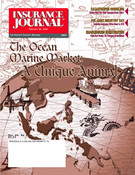After several months of silence, former California Insurance Commissioner Chuck Quackenbush returned to the headlines, this time to be relinquished of any possible federal charges.
According to the Sacramento Bee, an 18-month investigation conducted by federal, state and Sacramento County prosecutors concluded with no hard evidence to convict either Quackenbush or his former chief deputy at the California Department of Insurance (CDI) William Palmer.
Several years ago, Quackenbush allegedly struck a deal with insurance companies that allowed them to pay a settlement to the commissioner for claims some claimed were mishandled after the Northridge earthquake. Those funds were allegedly diverged into three separate foundations that were used, in part, to augment Quackenbush’s political image.
Quackenbush resigned from his post as California Insurance Commissioner in July 2000, and now resides in Hawaii. Palmer, who resigned from the CDI in July 1999, currently practices law in Sacramento.
George Grays, another former top-level aide to Quackenbush, pled guilty to federal charges of mail fraud and conspiracy to commit money laundering last year, and agreed, in exchange for a lighter sentence, to cooperate with federal investigators with regard to Quackenbush’s alleged misconduct. According to Grays’ attorney, former federal prosecutor William J. Portanova, “Mr. Grays had a separate but related problem which he admitted to. He agreed to testify truthfully in any trial… related to the same incident.”
However, it was further reported in the Sacramento Bee that investigators believed Grays’ testimony was not credible enough to implicate Quackenbush and Palmer. Grays is awaiting sentencing on March 28.
When contacted by Insurance Journal, the California District Attorney’s office said it could release no information regarding the Quackenbush investigation.
According to sources familiar with the investigation, the Attorney General’s silence could mean it is done with the investigation and does not want to continue to keep it in the news, or it is actively in the middle of a related investigation.
In fact, both Quackenbush and Palmer still confront the possibility of facing state charges. In addition, both Quackenbush and Grays are named among a number of other defendants in a civil suit filed in California Superior Court for the County of Sacramento by the State Attorney General’s office.
Portanova affirmed that the federal government was “definitely not going to file any charges,” and noted that it is not uncommon for federal or state task forces to eventually evolve into two separate investigations. However, he contended that it was possible, although unlikely, that Quackenbush would face state charges. “The alternative to criminal prosecution of course is civil lawsuits, and there are civil lawsuits seeking to reverse some of the transactions between the [former] Insurance Commissioner’s office and the various insurancecompanies,” Portanova said.
Meanwhile, any possible further litigation is being kept quiet. Portanova added, “Once an investigation’s confidentiality has been compromised, things change. As a rule, investigators and prosecutors like to keep these things to themselves, until the moment to act has come. In this case, whether the moment to act in any court remains to be seen.”
Topics California
Was this article valuable?
Here are more articles you may enjoy.


 How California’s Huge Raises for Fast-Food Workers Will Ripple Across Industries
How California’s Huge Raises for Fast-Food Workers Will Ripple Across Industries  North Carolina Adjuster and Son Charged With Embezzlement in Roof Jobs
North Carolina Adjuster and Son Charged With Embezzlement in Roof Jobs  Vintage Ferrari Owners’ Favorite Mechanic Charged With Theft, Fraud
Vintage Ferrari Owners’ Favorite Mechanic Charged With Theft, Fraud  Allstate Reports $731M in Q1 Pretax Catastrophe Losses
Allstate Reports $731M in Q1 Pretax Catastrophe Losses 


